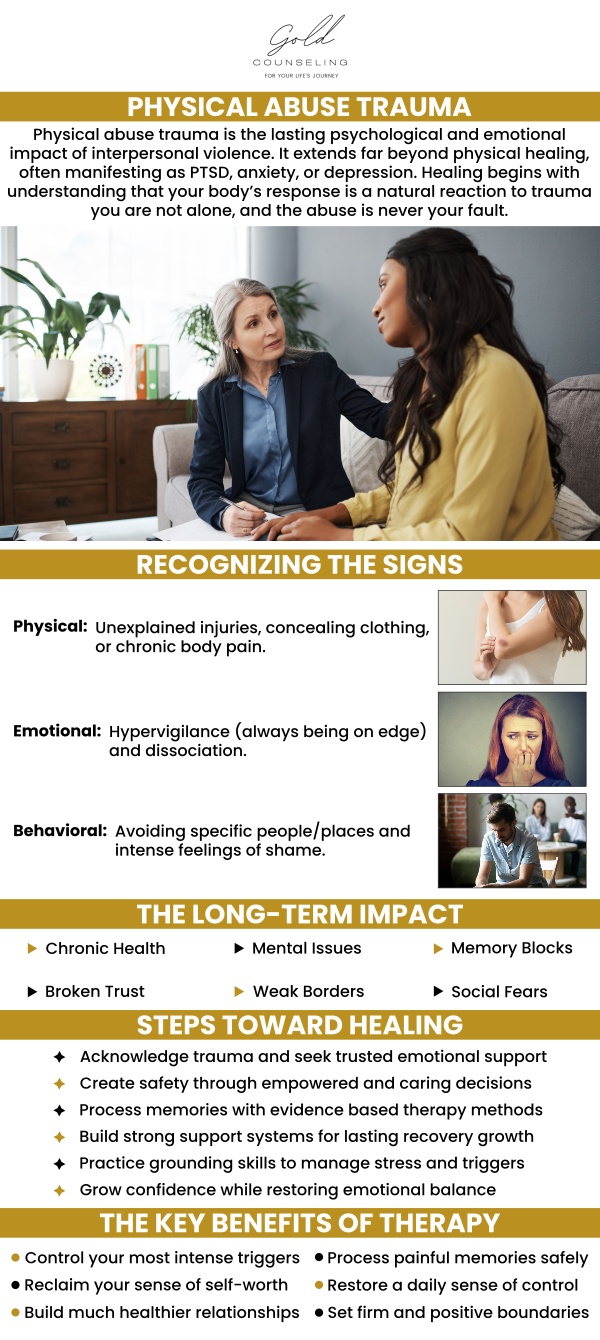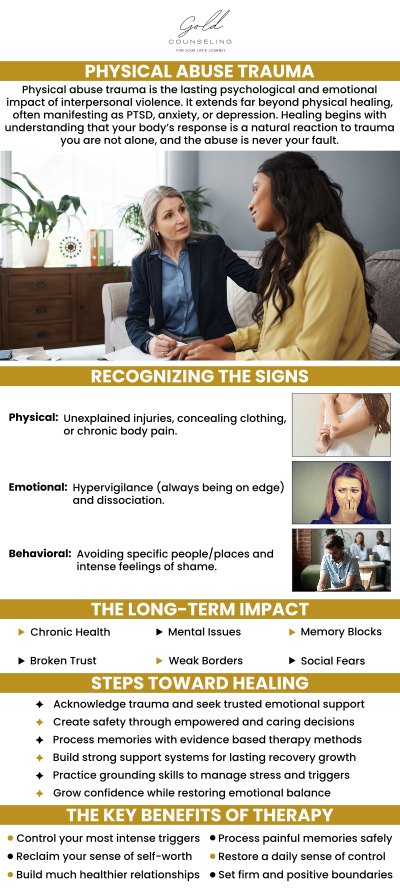Physical Abuse Trauma Therapy Q&A
At Gold Counseling, our team provides dedicated physical abuse trauma therapy to address the deep emotional and physical impacts of abuse. Through specialized therapeutic techniques, we assist individuals in processing their trauma, restoring safety, and rebuilding their lives. Our goal is to empower survivors, foster resilience, and promote enduring well-being. For more information, contact us or book an appointment online. We have convenient locations to serve you in Riverdale, Kaysville, Draper, and St. George UT.




Table of Contents:
What is physical abuse trauma?
What are the signs and symptoms of trauma from physical abuse?
Can physical abuse trauma have long-term effects?
How does physical abuse trauma affect mental and emotional health?
At Gold Counseling, we understand the deep-seated effects of physical abuse trauma. As a mental health clinic, we not only focus on the physical aspects of your health but also on your psychological and emotional well-being. Managing physical abuse trauma includes addressing the physical injuries, psychological distress, and long-term health issues associated with this form of interpersonal violence.
We understand the psychological impact of physical abuse trauma, which can manifest as PTSD, depression, anxiety, and other mental health conditions. Our team is equipped to provide counseling and therapy services to help victims cope with these psychological consequences.
Early intervention is essential for dealing with the trauma of physical abuse. Therefore, we encourage everyone to recognize and respond to the warning signs of physical abuse trauma. If you notice any signs of physical injuries, changes in behavior, or emotional distress in yourself or others, reach out to us immediately.
Our team at Gold Counseling is committed to providing a safe, supportive, and non-judgmental environment for victims of physical abuse trauma. We offer a range of resources, from immediate medical attention to long-term counseling and support services.
Remember that you are not alone and are not at fault for the abuse you have experienced. Physical abuse is always the abuser’s responsibility, and there is assistance available to help you begin your healing process. At Gold Counseling, we believe in the possibility of recovery and the power of resilience. Together, we can help you reclaim your health, your strength, and your life.
The signs and symptoms of trauma from physical abuse can manifest in a variety of ways, both physically and emotionally. In addition to personal characteristics like age and coping strategies, these symptoms can change based on the intensity, regularity, and length of the abuse. The following are common indications and symptoms:
Physical Signs:
Unexplained injuries: Bruises, cuts, burns, or fractures that don’t have a clear explanation or don’t match the provided explanation.
Frequent injuries: A pattern of frequent or recurring injuries, sometimes in different stages of healing.
Wearing concealing clothing: Often wearing long sleeves, pants, or scarves even in warm weather to hide injuries.
Chronic pain or complaints: Persistent headaches, stomach aches, or other unexplained physical complaints that may be stress-related.
Sleep Disruption: Sleep issues such as nightmares or difficulty falling or staying asleep.
Emotional and Behavioral Signs:
Anxiety and fearfulness: A strong sense of fear or worry, especially with certain people or in certain situations.
Depression: Feelings of hopelessness, sadness, or worthlessness that may lead to withdrawal from social situations.
Avoidance behavior: Avoiding certain people, places, or situations that may remind them of the trauma.
Hypervigilance: Being very attentive or easily startled, hypervigilance is the state of continuously looking around for dangers.
Anger and irritability: Unexplained outbursts of anger, irritability, or aggressive behavior.
Low self-esteem: Feelings of shame, guilt, or believing they are to blame for the abuse.
Dissociation: Feeling detached from reality, experiencing memory gaps, or having a sense of being disconnected from their body or emotions.
Difficulty trusting others: Developing trust issues, having trouble forming or maintaining close relationships.
Self-harm: self-harming practices as a coping method, such as burning, cutting, or abusing drugs.
Flashbacks or intrusive thoughts: Re-experiencing the trauma through flashbacks, unwanted thoughts, or intense memories.
Cognitive and Social Signs:
Trouble concentrating: Difficulty focusing, making decisions, or maintaining attention in daily tasks.
Withdrawal: cutting off contact with loved ones, friends, or social events they used to enjoy.
Aggressive or destructive behavior: Lashing out at others, breaking things, or engaging in risky behaviors.
Regressive behaviors (in children): In younger individuals, behaviors such as bed-wetting, thumb-sucking, or clinging to a caregiver.
Early detection of these symptoms is essential for obtaining assistance and offering the required support to those who have experienced trauma from physical abuse.
At Gold Counseling, we understand the profound effects physical abuse trauma can have on an individual’s life. We recognize the importance of integrated health care in addressing both the physical and emotional aftermath of such devastating experiences.
The long-term consequences of physical abuse trauma can include chronic physical health problems, substance abuse, and social isolation. Our comprehensive approach to therapy addresses these issues, helping survivors manage chronic pain, overcome substance abuse, and rebuild their social networks.
Our team of experienced mental health counselors is equipped to handle PTSD, depression, and anxiety disorders that may arise from physical abuse trauma. At Gold Counseling, we offer trauma-informed care and evidence-based treatments to help survivors navigate their emotions, memories, and reactions associated with the traumatic event.
We also provide support for individuals struggling with substance abuse as a coping mechanism. Our alcohol and drug addiction treatment programs emphasize the importance of addressing the underlying causes of addiction, such as physical abuse and trauma.
We understand the social implications of physical abuse trauma and the difficulty survivors may face in forming healthy relationships. Our counseling services extend to help survivors rebuild trust, improve social interactions, and regain a sense of self-worth.
We also provide resources and support to help survivors manage potential employment and financial instability resulting from their traumatic experiences.
We also provide family therapy to address the intergenerational effects of physical abuse trauma. Our therapists work with families to disrupt patterns of violence and create a safe, supportive environment for healing.
Our team of medical and mental health professionals, along with our social support network, are here to guide survivors on their journey to recovery.
At Gold Counseling, we understand the profound effects that physical abuse trauma can have on an individual’s mental, emotional, and cognitive health. Our expert team is dedicated to helping survivors navigate the complex psychological disturbances that such trauma can induce, including post-traumatic stress disorder (PTSD), depression, and anxiety disorders.
We recognize the emotional dysregulation that often accompanies physical abuse trauma, from difficulty expressing and controlling emotions to self-destructive behaviors. Our therapists are skilled in helping survivors develop healthy emotional regulation skills, enabling them to manage their emotional turmoil effectively.
Cognitive impairments are another common consequence of physical abuse trauma. Memory problems, difficulty concentrating, impaired attention, and issues with logical reasoning and decision-making can all be addressed through our cognitive-behavioral therapies.
Physical abuse trauma can impact interpersonal relationships and lead to behavioral disorders. Our counseling services provide survivors with the tools they need to build and maintain healthy relationships, and we offer specialized therapy for those dealing with disruptive behavior disorders.
Remember, healing takes time and consistent effort, but with the support of the Gold Counseling team, survivors can turn their traumatic experiences into a stepping stone toward a healthier, happier future. For more information, contact us or book an appointment online. We serve patients from Riverdale UT, Washington Terrace UT, Clinton UT, Kaysville UT, Clearfield UT, Farmington UT, Draper UT, Riverton UT, Sandy UT, St. George UT, Bloomington UT, Santa Clara, UT, and surrounding areas.
Check Out Our 5 Star Reviews



Additional Services You May Need
▸ Relationship Counselling
▸ Couples Counselling
▸ Individual Therapy
▸ EMDR Therapy
▸ Spiritual Healing
▸ Disordered Eating
▸ LGBTQIA+ Therapy
▸ Group Psychotherapy
▸ Life Coaching Therapist
▸ Depression Treatment
▸ Mental Health Clinic
▸ Life Transition Therapy
▸ Telehealth Counseling
▸ Cognitive Behavioral Therapy (CBT)
▸ Dialectic Behavioral Therapy (DBT)


